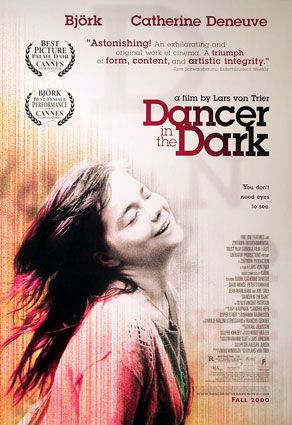“Revolutionary Musical”

| None | Light | Moderate | Heavy | |
|---|---|---|---|---|
| Language | ||||
| Violence | ||||
| Sex | ||||
| Nudity |
What You Need To Know:
This redemptive act doesn’t make sense. The case is designed to condemn all things American and exploits Selma to do so. In its total lack of authenticity, this is an America populated only by Europeans. It must be noted, however, that the musical numbers are entertainingly woven into the story. At the press conference after the screening, one reporter who was offended by the movie asked, “What must be done to end Dogme film?” Lars responded, “Make better Hollywood films.” Frankly, Mr. Von Trier, they do.
Content:
(PCPCPC, CC, ACapACap, L, VV, D, MMM) Strong politically correct cultural Marxist worldview with a redemptive storyline & 2 Christian references as well as anti-Capitalist & anti-American elements; 3 obscenities & 2 profanities; threats of violence, strong sense of jeopardy, explosive violence when simple woman who is going blind kills the policeman who stole her money; no sex; no nudity; no alcohol; cigarette use; and, lying & theft are major plot elements.
More Detail:
In a press conference with media darling Lars von Trier after the movie, it became clear that these Dogme rules were not an intelligent re-evaluation of filmmaking, but rather a cover for ignorance and a lack of budget to produce Hollywood-type movies. In fact, after listening carefully to him, it was clear that Lars is in some ways a lazy filmmaker who has not done his homework, but has a verbal gift which enables him to rationalize his incompetence and bash his enemies, real or imagined.
Regrettably, Dogme is the flavor of the decade. Reportedly, at least 14 movies are waiting to be registered as Dogme films. Now, Hollywood wants to make Dogme films. One can only wait for this fad to pass.
DANCER IN THE DARK is the first Dogme musical, and it may be the most annoying Dogme film, although it breaks many of the Dogme rules.
Selma is a Czech immigrant to the United States. The role is played by Bjork, a completely non-professional actress, who is highly emotional. Selma works in a factory where her sight is very important, but she’s going blind. To keep working, she deceives her best friend, Kathy (played by Catherine Deneuve), and the eye doctor by memorizing the eye chart.
The shop foreman is suspicious of Selma’s bad eyesight and worried that she will hurt herself or destroy the equipment. When Kathy covers for Selma, the foreman accuses them of being Communists.
Selma wants to keep working so that she can save up for her son, Gene, to have an eye operation. Evidently, he has the same genetic eye problem that she does.
She rents a trailer from a policeman named Bill, and his wife. Bill has inherited a little money, but the wife has squandered it.
One night, Bill sees Selma hiding the money she’s saving; and, eventually, he steals it. When Selma goes to Bill to demand her money, she accidentally shoots him. He begs to be killed, and, regrettably, Selma ends up killing him in a very violent scene.
Selma takes the money from Bill’s safe deposit box and pays it to the doctor for the operation. Then, she is brought to trial. She is convicted, but is told that another lawyer can get her sentence commuted for $2,056.10 in legal fees, the exact amount she saved for her son’s operation. She refuses to redirect the money, and so, she sacrifices herself for her son.
Of course, this is a powerful redemptive act, but, upon reflection, it doesn’t make sense. The American legal system goes out of its way to protect people in Selma’s position, especially women. Legal aid lawyers would have made themselves available to help her. The case in the movie is pointedly designed to condemn all things American and exploits Selma and her blindness for the cause of the revolution. Her redemptive sacrifice is so mishandled that it pales in the face of the politically correct message.
What is more troubling about the movie, however, is its almost poignantly ignorant attack on America and on anything that doesn’t agree with its point of view. This is a movie that stands for the little man not in a biblical way, which would give him or her the opportunity to fulfill their gifts and talents, but in the Marxist way, which tries to cut everyone else down to size.
Also, there was no effort made to make the movie accurate. One of the stars was so upset by the inaccuracies that she walked off the set because the movie has Selma hanged, but the hanging of women stopped in 1964.
This fraudulent America is populated only by northern Europeans and set in the European countryside. There are no black or Hispanic guards in the prison, and the lack of non-Caucasians is annoying.
In its total lack of authenticity, DANCER IN THE DARK is almost a childlike movie, similar to the first films that my children made in our backyard with our video equipment.
In favor of the movie, it must be noted, however, that the musical numbers are entertainingly woven into the drama. Selma hears the factory equipment going clickety-clack, and seamlessly the factory workers break into a dance number. She walks along the railroad, and slowly the workers break into dance. This is not a Hollywood musical but more like an updated Socialist Realist musical. Even so, the musical element works to the movie’s advantage.
The movie drew a mixed reaction from the audience at the Cannes Film Festival. First, there were boos, then applause – almost dueling with each other.
At the press conference, some of the reporters were actively hostile. One reporter asked, “What must be done to end Dogme film?” Lars von Trier responded, “Make better Hollywood films.” Frankly, Mr. Von Trier, they do.


 - Content:
- Content: 

